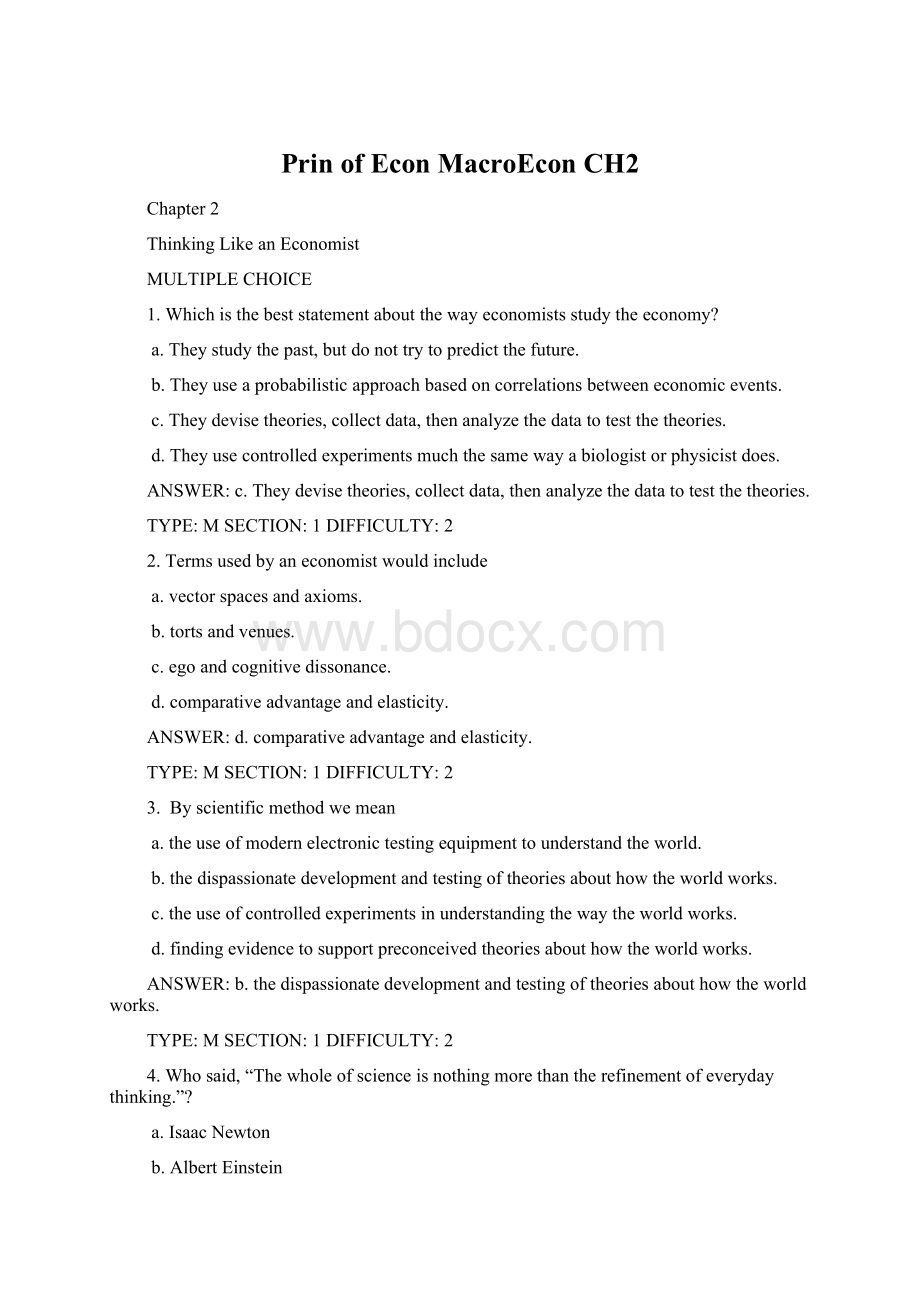Prin of Econ MacroEcon CH2Word格式文档下载.docx
《Prin of Econ MacroEcon CH2Word格式文档下载.docx》由会员分享,可在线阅读,更多相关《Prin of Econ MacroEcon CH2Word格式文档下载.docx(61页珍藏版)》请在冰豆网上搜索。

2
2.Termsusedbyaneconomistwouldinclude
a.vectorspacesandaxioms.
b.tortsandvenues.
c.egoandcognitivedissonance.
d.comparativeadvantageandelasticity.
3.Byscientificmethodwemean
a.theuseofmodernelectronictestingequipmenttounderstandtheworld.
b.thedispassionatedevelopmentandtestingoftheoriesabouthowtheworldworks.
c.theuseofcontrolledexperimentsinunderstandingthewaytheworldworks.
d.findingevidencetosupportpreconceivedtheoriesabouthowtheworldworks.
4.Whosaid,“Thewholeofscienceisnothingmorethantherefinementofeverydaythinking.”?
a.IsaacNewton
b.AlbertEinstein
c.SigmundFreud
d.BenjaminFranklin
1
5.AlbertEinsteinoncemadethefollowingobservationaboutscience:
a.“Thewholeofscienceisnothingmorethantherefinementofeverydaythinking.”
b.“Thewholeofscienceisnothingmorethananinterestingintellectualexercise.”
c.“Inordertounderstandscience,onemustrelysolelyonabstraction.”
d.“Inordertounderstandscience,onemusttranscendeverydaythinking.”
6.SirIsaacNewton’sdevelopmentofthetheoryofgravityafterobservinganapplefallfromatreeisanexampleof
a.controlledexperimentsusedtodevelopscientifictheories.
b.beingintherightplaceattherighttime.
c.anideawhosetimehadcome.
d.theinterplaybetweenobservationandtheoryinscience.
7.Acommonthreadbetweeneconomicsandothersciencessuchasphysicsisthat
a.experimentsaremostoftenconductedinalab.
b.real-worldobservationsoftenleadtotheories.
c.aPh.D.isrequiredtotrulyunderstandanyscience.
d.bothdealprimarilywithabstractconcepts.
8.Theuseoftheoryandobservationismoredifficultineconomicsthaninsciencessuchasphysicsduetothedifficultyin
a.evaluatinganeconomicexperiment.
b.devisinganeconomicexperiment.
c.actuallyperforminganexperimentinaneconomicsystem.
d.Alloftheabovearecorrect.
9.Becauseitisdifficultforeconomiststouseexperimentstogeneratedata,theygenerallymust
a.dowithoutdata.
b.usewhateverdatatheworldgivesthem.
c.selectacommitteeofeconomiststomakeupdataforalleconomiststouse.
d.usehypothetical,computer-generateddata.
10.Whentestingtheories,economists
a.mustmakedowithwhateverdatatheworldgivesthem.
b.canmanipulateeconomicconditionseasierthanotherscientificfields.
c.canenlistthegovernment’shelptomanipulateeconomicconditions.
d.canachievestatisticallyvalidresultswithmuchsmallersamplesizes.
11.Onedifficultyeconomistsfacethatsomeotherscientistsdonotisthat
a.unlikeothersciences,economicstudiesmustincludethelargesteconomicplayer,thegovernment.
b.economistsunfortunatelyreceivelessgovernmentfundingthanotherscientists.
c.corporationsarereluctanttodisclosenecessaryinformationforeconomicresearch.
d.experimentsareoftendifficultineconomics.
12.Themostcommondatafortestingeconomictheoriescomefrom
a.carefullycontrolledandconductedlaboratoryexperiments.
b.traditionaleconomies.
c.historicalepisodesofeconomicchange.
d.centrallyplannedeconomies.
13.Foreconomists,substitutesforlaboratoryexperimentsareoften
a.naturalexperimentsofferedbyhistory.
b.computer-generatedexperiments.
c.studiesconductedbyotherdisciplinessuchassociologists.
d.well-constructedsimulations.
14.Economistsmakeassumptions
a.todiminishthechanceofwronganswers.
b.tomaketheworldeasiertounderstand.
c.becauseallscientistsmakeassumptions.
d.tomakecertainthatallnecessaryvariablesareincluded.
15.Theartofscientificthinkingincludes
a.knowinghowthemajororgansofthehumanbodywork.
b.understandingeveryscientificfield—physics,biologyandeconomics.
c.decidingwhichassumptionstomake.
d.beingabletomathematicallyexpressnaturalforces.
16.Ifaneconomistdevelopsatheoryaboutinternationaltradebasedontheassumptionthatthereareonlytwocountriesandtwogoods,
a.thetheorycanbeusefulonlyinsituationsinvolvingtwocountriesandtwogoods.
b.itisatotalwasteoftime,sincetheactualworldhasmanycountriestradingmanygoods.
c.thetheorycanbeusefulinhelpingeconomistsunderstandthecomplexworldofinternationaltradeinvolvingmanycountriesandmanygoods.
d.thetheorycanbeusefulintheclassroom,buthasnouseintherealworld.
17.The1973warintheMiddleEastprovidedeconomistswiththeopportunitytoobservetheinverserelationshipbetween
a.oilpricesandlivingstandards.
b.militarybuildupsandgovernmentspending.
c.theflowofcrudeoilandoilprices.
d.theflowofcrudeoilandpoliticalpower.
18.Historicalepisodesarevaluabletoeconomistsbecause
a.itallowseconomiststoseehowfarthedisciplinehasevolved.
b.hindsightisalways20/20.
c.itiseasiertoevaluateapastsituationthantopredictafuturesituation.
d.theyalloweconomiststoevaluateeconomictheoriesofthepresent.
19.Whatwouldbethebeststatementaboutatheorybasedonassumptionsthatarenottrue?
a.Iftheassumptionsunderlyingthetheoryarenottrue,thetheorymustbefalse.
b.Theideasmaybegoodintheory,butnotinpractice.
c.Thetheoryisagoodoneifithelpsustounderstandhowtheworldworks.
d.Thetheoryisagoodoneifnologicalmistakesweremadeindevelopingit.
3
20.Whatisthegoaloftheories?
a.toprovideaninteresting,butnotuseful,frameworkofanalysis
b.toprovokestimulatingdebateinscientificjournals
c.todemonstratethatthedeveloperofthetheoryiscapableoflogicalthinking
d.tohelpscientistsunderstandhowtheworldworks
21.Wheneconomistsattempttosimplifytherealworldandmakeiteasiertounderstandtheymake
a.assumptions.
b.mistakesinjudgment.
c.predictions.
d.evaluations.
22.Goodassumptionscan
a.causeeconomiststoleaveoutimportantvariableswhichmaketheirtheoriesworthless.
b.simplifythecomplexworldandmakeiteasiertounderstand.
c.furthercomplicateanalreadydifficulttopic.
d.alloweconomiststoseethe‘bigpicture’insteadofonlysmallsegments.
23.Forascientist,thedecisionofwhichassumptiontomakeis
a.theeasiestpartofthescientificmethod.
b.theflipofacoin.
c.almostimpossible.
d.partart.
24.Theartofscientificthinkingis
a.easierwithasolidmathematicalbackground.
b.theabilitytomakeanabstractsubjecteasytounderstand.
d.notnecessarytobeaneconomist.
25.Whenscientistsmakegoodassumptions,they
a.greatlysimplifytheproblemwithoutsubstantiallyaffectingtheanswer.
b.furthercomplicateanalreadycomplicatedsubject.
c.canleaveoutnecessaryvariablesthatmayresultinincorrectanswers.
d.maynotbeabletoreachanappropriateconclusion.
a.greatlysimp